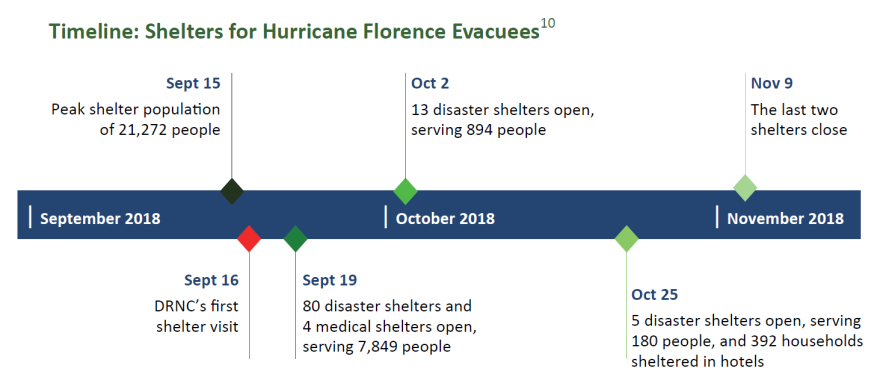Goose Creek Island is no more than 9 square miles. It's reachable only by a small bridge over a narrow offshoot of the Pamlico River. The island is dotted with only a few homes. But that's a good thing for Terry Helvie who lives on the island with her two adult children. Both her son and daughter have developmental disabilities. Her son Logan can make a racket at times, but that's OK on the sparsely populated island.
"We don't have to worry about someone saying, 'Hey you're making too much noise,'" said Helvie.
As Hurricane Florence barreled toward the Carolinas, Terry Helvie and her children were forced to evacuate to a shelter farther inland. They met a new set of challenges there. Logan is afraid of the dark, but shelter volunteers held to a strict lights out policy.
"I said, 'Please just leave a little panel for us.' And she said no," said Helvie. "And I said, 'Please, my son will tantrum, he's deathly afraid of the dark, please I’m begging you.'"
The darkness did frighten Logan and he cried for hours. The next morning, the shelter staff kicked the Helvies out. With nowhere to go, they ended up, exasperated, in a Walmart parking lot.
"And we sat there and my son was crying, and extending his hand out, his finger out and pointing, and that was saying – because he's nonverbal – that he wanted to go home. And my daughter was crying. And she wanted to go home."
With no shelter options, they hitched a ride back to their home on Goose Creek Island. But it was so damaged that they couldn't stay inside. So they spent the night on the porch. That was one of the longest nights of Helvie's life. She has always put her children's needs ahead of her own. But that night, a feeling of devastating helplessness washed over her.
"My kids are autistic, you know, they have Asperger's. I've always said as long as I've got a breath in my body, my kids wouldn't be on the streets. They wouldn't go hungry, they wouldn't be without the basic necessities. And they took that from me," said Helvie. "It was like a nightmare. You want to freak out. You want to scream, you want to holler, you want to lose it."

But things did get better in the morning. Helvie connected with Disability Rights North Carolina and she got back to a shelter. Then to a rental in Hamlet, N.C. where she and her children stayed while their house was repaired
The treatment the Helvies received at the shelter was not unique, say advocates like Cas Shearin, director of the Investigations and Monitoring unit at Disability Rights North Carolina.
In a disaster, children and adults with disabilities are two to four times more likely to be injured or die. During disaster evacuations, people with disabilities are more likely to be left behind, turned away from shelters or abandoned. And during Hurricane Florence, people with disabilities were largely evacuated to inaccessible shelters or even separated from their families entirely. All these statistics come from the advocacy group Disability Rights North Carolina.
Shearin recalled one shelter manager who referred to a family as "dairy farmers."
"And when we asked what that meant, he said, 'Well, they're milking the system,'" said Shearin.
That manager was referring to a family who had members with autism.
"And so that kind of lens in managing a shelter [is] not compassionate," said Shearin.

Disability Rights NC inspected 26 shelters after Florence. It found problems with physical accessibility and lack of access to important services. Shearin says federal, state and local emergency management officials are not addressing the needs of people with disabilities during the disaster preparedness process.
Iris Green is a senior attorney with Disability Rights NC and wants to improve preparedness before the next disaster hits.
"We're trying to make sure that the state knows that they are responsible for people with disabilities before and after disaster," said Green. "And make sure that those people are trained. And that they are available. And we have enough of them to be able to meet the needs of all people with disabilities during our next disaster.
State emergency personnel say they are mindful of families with special needs. They try to accommodate everyone, and have special medical shelters in addition to those for able-bodied evacuees. North Carolina Emergency Management spokesperson Keith Acree says the sheer size of Florence presented unique problems.
"We've never had a sheltering operation that big in North Carolina. If you go back to the previous biggest event before Florence, [we] only sheltered between four and five thousand people during Hurricane Matthew," Acree said. "And we did like 30,000 during Florence."
Typically, the state and local governments operate shelters during a disaster, and hand them over to the American Red Cross during recovery. Both Helvie and the disability rights advocates said they witnessed more egregious examples of mistreatment by Red Cross volunteers. A Red Cross representative did not agree to an interview but provided a statement.
"Our shelter workers make every effort to ensure that everyone who comes to the Red Cross is treated with dignity and has access to the best possible assistance," the statement reads.
At some point, another hurricane is going to hit North Carolina. Without the right preparation, disability rights advocates fear that more families will not get the help they need.










